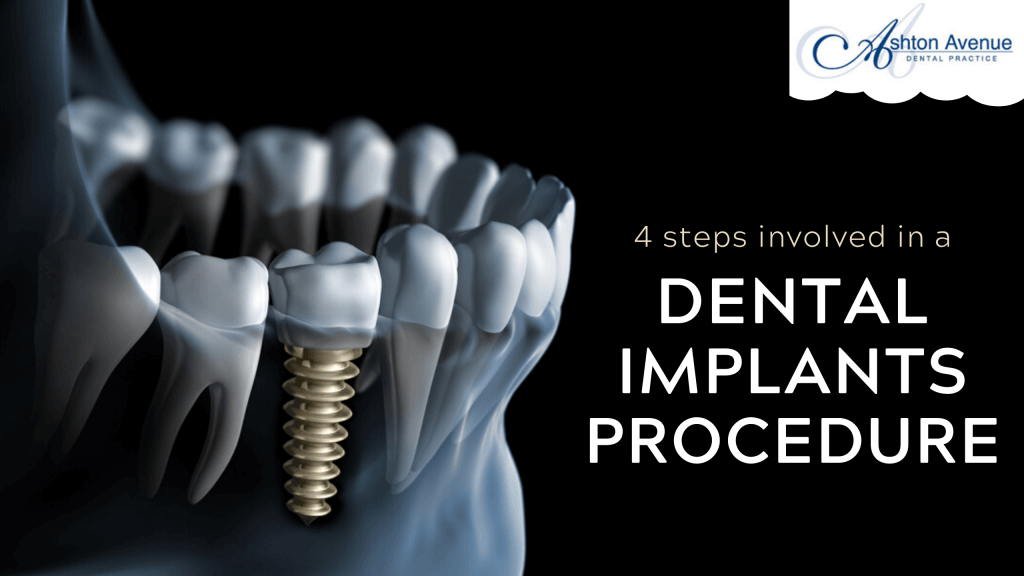Do you have a tooth that cannot be saved or a tooth that is failing? Dental implants are artificial tooth roots that are inserted into the jawbone to replace missing teeth. It is a more sophisticated way of missing teeth replacement than the old dentures and partial dentures.
Implants work like natural tooth roots, it integrates with the jaw bone and anchors the artificial tooth over it, which makes it much more comfortable than dentures. Dental implants also help to withstand greater bite pressure and like natural teeth, it is surrounded by gum tissue and does not require any special cleaning. Just treat it as your real teeth!
Here at Ashton Avenue Dental Practice, we will guide you through the process of a dental implants procedure.
What are Dental Implants?
Dental implants are now one of the best options to replace failing or missing teeth by the insertion of a titanium implant into the jawbone. The titanium implant will form a strong integration with the surrounding bone tissue where we will then insert the abutment of the implant followed by the attachment of the artificial tooth.
What are the 4 steps involved in a dental implant procedure?
1. Preparing implant hole
The first stage of the implant is to extract the tooth which is failing or can not be saved. The tooth should be removed traumatically, preserving as much of the surrounding bone as possible. After this procedure, surgical grafting is done by filling the socket with grafting materiel which is normally synthetic or xenograft. If the tooth is already missing, then we can skip this step.
Once the site has healed the dentist will prepare the implant hole. Your dentist will first site a spot in the gums to expose the hidden bone. A drill is used to create the hole inside the jawbone so that it can accept the implant.
Also, it is not always necessary to fit in the implant on every missing tooth. This is because a single implant works like a “bridge” for the artificial tooth. It is always advisable to always ask our expert dentists on how many implants are required for you.
2. Insertion of the implants
The next most important step of the implant is the insertion of the implant. In this stage, the cylindrical looking implant with its threaded surface is screwed into the drilled hole. The gums are then stitched to close, and removed after a week or 10 days. After some time, the stability is improved, and the bone grows over the implant surface.
The procedure is called osseointegration as well as bio integration. This process can take up to 6 months to get integrate with the implant.
3. Healing abutment installation
During the post healing period, the whole implant will be surgically exposed and attached with a healing abutment. The fresh exposed tissue will take 2-3 weeks to heal. Once the gum begins to heal, we will commence with the next procedure.
4. Fixing the artificial tooth
After the above process, now it is time to attach the artificial teeth. The implant is tested if it is strong enough to support when the artificial tooth is fixed to its Impressions are taken, an implant crown is custom designed and fabricated. The crown is then attached to your implant with an abutment, screw and access hole is filled.
Once these artificial tooth/teeth are attached, the X-ray is performed in order to check whether the placement is successfully implemented.
Cost
The cost of dental implants depends upon your dental situation. There are different factors such as the position of the missing tooth, bone density level, volume, and the dental crown you choose.
How to look after your implants:
Flossing and brushing: ensure you continue to floss and brush regularly to prevent the build-up of plaque. Brush your teeth at least two times per day or after every meal. Give extra attention to each side of your implants.
Interdental brushes: Interdental brushes may be recommended as a part of your oral hygiene routine as the small brushes are more effective in removing pieces of food and plaque from around the sides of your implants.
Visit your dentist regularly: Regular dental checkups are important as this will allow your dentist to monitor the progress of your implants and ensure your implants are in good condition and given the professional clean they need.
Smoking: Refrain from smoking as it is known to reduce the bone around the implant and increases the risk of implant failure.
For detailed consultation regarding dental implants reach us at 08 6183 3800. At Ashton Avenue Dental Practice, our professional Claremont dentist get into all details to provide you with the best results.






